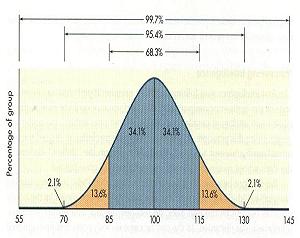Michael Dowling's IQ is Irrelevant
 | | He looks like any other 13-year-old geek to me |
Michael Dowling, 13, is working on his fourth fantasy novel with the help of his mother, an Oxford don in English, under the pen name of Tobias Druitt. However, the main reason Michael Dowling has gotten the attention he has in the popular media, especially in Great Britain, is his IQ of 170. People are calling him smarter than Einstein, whose IQ has been estimated to be around 160 (despite the fact that Albert Einstein never took an IQ test and that IQ scores are typically tallied in such a way that a score of 160 in the forties is not equivalent to a score of 160 nowadays), and reporters are falling over themselves to get Dowling's opinions on everything from particle physics to the virtues of home-made potato chips.
I will attempt to be nice to young Dowling, as none of this is his fault. It is hard, though, because I am jealous that he was gifted with an Oxford don in English as a mother, thereby ensuring his ability to find a publisher. I've been writing since I was younger than Dowling, and yet I'm still unpublished; I do not attribute the difference to IQ, but to luck and circumstance. (And yes, I am bitter.)
IQ, you see, is not a measure of a person's worth. Even more startling is that it is not a measure of a person's intelligence. When the idea of an intelligence quotient was first conceived by the likes of Willain Stern, Alfred Binet, and Theodore Simon, it was originally designed to be a test of a child's academic potential. It was not originally designed to measure a person's innate intelligence, and it has never succeeded in doing that.
 | | If he was so smart, how come he was a smoker with a bad haircut? |
The simplest argument against IQ is the possible existence of multiple intelligences. The most well-known example of multiple intelligences is a theory by Howard Gardner, which proposes that there are at least eight different modes of intellect: intrapersonal, naturalist, kinesthetic, musical, interpersonal, logical/mathematical, linguistic/verbal, and spatial (I still remember the "INK MILLS" mnemonic from my college psych courses). Modern IQ tests, at best, only measure the last three of these, and do not take into account the rest.
An athlete, for example, could have ridiculously high kinesthetic, spatial, and naturalist intelligence, but score a low IQ due to a deficiency in math and verbal skills. While this athlete would probably do poorly in school, he or she could still be a huge success in life, earning millions of dollars, competing in the Olympics, or becoming a great athletic teacher. Another example would be musical prodigies like Mozart, who would undoubtably have a high degree of musical intelligence but would likely score very poorly in a standardized IQ test. Conversely, a person with a high IQ, like Dowling, would probably be deficient in other areas.
There are other theories of multiple intelligence as well, ones that include emotional, existential, analytic, creative, practical, and even empirical traits as possible modes of intellect. You could probably take it to such an extreme that you could flatten out the bell curve entirely and argue that, aside from those with provable neurological deficits, everybody has the same fixed amount of intelligence. Indeed, many psychologists have attempted to make that very argument.
I'm not willing to go that far, but I do believe that, even if you could accurately measure every possible type of intelligence in a person, you could still not accurately determine how successful that person would be in life. Intelligence, if anything, is merely the potential to be great; it is neither a guarantee nor a prerequisite for greatness.
 | | If IQ is the only meaningful measure of success, how do you explain Paris Hilton? |
This brings me back to Michael Dowling. If you take his IQ out of the equation, you see a child who is incapable of having a normal childhood. Granted, it's hard to say what "normal" is, but when you take a young kid, put him in the spotlight, and proclaim that you expect nothing but greatness from him, three things are going to happen: 1) the kid will be hounded by the media for the rest of his life, 2) the kid will inevitably disappoint by being human, and 3) he will blame you for it.
Let's face some facts. Truly great people on this Earth are not always our most intelligent people. In fact, our most intelligent men and women often live in obscurity while others take positions of power and fame. We like to think that theoretical physics is the realm of the egghead, and yet most of us can only name one--maybe two--theoretical physicists living today (it's usually Stephen Hawking). Without blushing, of course, we can probably name a dozen or so professional athletes, actors, politicians, musicians, and writers. Indeed, Michael Dowling has expressed interest in a career in particle physics, where he will no doubt disappear from the public spotlight.
And despite my jealousy, I am thrilled that there are kids who can get published out there. I believe that, for every kid who does get published, there are probably ten more kids capable of success who never make it to the bookshelves. This is an unfortunate reality of the publishing industry and a subject that should be left for another day. The bottom line here is that Dowling should be taken on his own merits and not those of a pointless academic exercise.
Besides, IQ tests, assuming they measure anything, get fuzzier the higher a person scores. At the uppermost limit of measurable human intelligence, the number can fluctuate by as much as thirty or forty points. Additionally, the correlations between IQ and excellence in any field are never a hundred percent, so even if a person scored an unimaginable 200 on the IQ scale, he or she could still fail, both academically and existentially. (Note: the IQ scale is a statistical average of a given population, with 100 being the mean; therefore, IQ is really just a measure of standard deviation, not a fixed mathematical value.)
 | | A typical IQ bell curve |
The underlying conceit is that people with high IQs are better than people with low IQs. Common sense tells us this is false, but it's a pervasive notion that most people unconsciously believe. Thus, us lowly people with IQs under 170 tend to look at Michael Dowling as an intellectual superior, and we are reinforced by media that fawn over him as though he were a child of God. Additionally, people with high IQs tend to look down on those with low IQs, and there is nothing more distasteful in the human psyche than a superiority complex.
This is not to say IQ is without merit. It does seem to predict--with a fairly high degree of accuracy--how well a child will do in school. There is also a compelling correlation between IQ and job security, as well as IQ and income, though the degree of correlation is less than that of IQ and academic success. In short, the only way an IQ test should probably be used--to help target a child's education--is the only way it was originally intended to be used. The one thing it should never be used for is deciding who is the most worthy of media attention.
Even Alfred Binet, one of the progenitors of IQ testing, didn't believe that intelligence could be measured using his methods. He said that his scale "does not permit the measure of intelligence, because intellectual qualities are not superposable, and therefore cannot be measured as linear surfaces are measured." Unfortunately, thanks to the inventions of Binet and his contemporaries, it is now a common belief that intelligence is an innate and fixed attribute of a person. If even they didn't believe this, why do we?
-e. magill, 03/30/2009
|
|